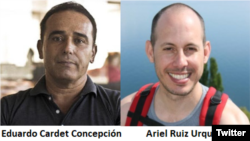The Cuban government continues to imprison critics of the communist regime. The United States, said State Department spokesperson Heather Nauert, “reiterates its deep concern for political prisoners in Cuba.”
The cases of Dr. Ariel Ruiz Urquiola and Dr. Eduardo Cardet, both of whom have been declared “prisoners of conscience,” by a prominent human rights organization, are just two examples of how the Cuban government continues to silence the peaceful opposition of its own citizens.
Human rights activist Dr. Cardet is serving a three-year sentence for allegedly criticizing former Cuban leader Fidel Castro. In May, Cuban authorities told his family they would not be allowed to visit him in jail for six months as a punishment for his family’s efforts to raise awareness of his case internationally.
Also last month, a court in Cuba sentenced scientist and environmental activist Dr. Ruiz Urquiola to a year in prison for allegedly disrespecting government authority. Cuban government officials have harassed Dr. Ruiz Urquiola for years for speaking out on environmental issues. Ms. Nauert said, “We are deeply troubled by reports that he is currently on a hunger strike and in a critical medical condition.”
According to the most recent State Department human rights report, the exact number of political prisoners in Cuba was difficult to determine, though independent human rights organizations recently estimated there were more than 120 political prisoners. The government denies holding any political prisoners and refuses access to its prisons and detention centers by international humanitarian organizations and the United Nations.
This lack of governmental transparency, along with systemic violations of due process rights, obfuscates the true nature of criminal charges, investigations, and prosecutions, allowing government authorities to prosecute and sentence peaceful human rights activists for criminal violations. The government uses the designation of “counterrevolutionary” for inmates deemed to be political opposition but does not publicize those numbers.
The United States calls on the government of Cuba to release all political prisoners immediately and to stop its arbitrary detention of Cuban activists and independent thinkers who criticize their government through peaceful means. The Cuban government must also cease its reprisals against the family members of these activists.






